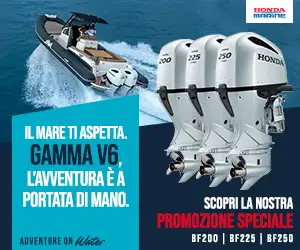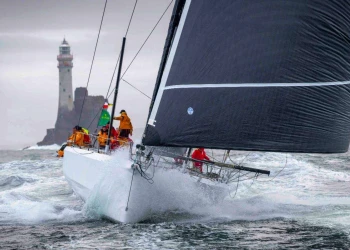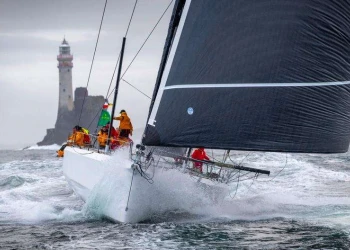
France annihilates Rolex Fastnet Race competition for a third time
France annihilates Rolex Fastnet Race competition for a third time
France galvanised its reputation as the world's greatest offshore racing nation by dominating the results across the majority of the classes in the Rolex Fastnet Race for a third consecutive occasion. Of the 11 main prizes, French boats failed to win just three, and of these one (Dongfeng Race Team) was raced by a largely French crew.
The Royal Ocean Racing's biennial flagship event this year attracted another record-sized fleet of 362 boats, six more than 2015. It continues to be the world's largest offshore yacht race, and also the most popular - when registration opened, the IRC fleet's maximum limit of 340 boats was reached in just 4 minutes and 24 seconds!
As ever the course took the giant fleet west down the English Channel, either side of the prohibited 'traffic separation scheme' zone between Land's End and the Scilly Isles, across the Celtic Sea to the Fastnet Rock, four miles off southwest Ireland, back south leaving Bishop Rock and the Scilly Isles to port and then, on past the Lizard, to the finish off Plymouth - in total 605 nautical miles.
Equally impressive as the size of the Rolex Fastnet Race fleet was its diversity, ranging from many of the world's top offshore racing teams, either privately owned or sponsored, down to smaller amateur family and friends entries to sailing schools featuring individuals for many of whom the Rolex Fastnet Race would rank as the 'Everest' of their offshore racing careers.
The traditional Sunday staggered start on the Solent, taking place the day after Cowes Week, was spectacular, the giant fleet setting off by class, starting with the multihulls at 1100 and finishing 1hr 40 minutes later with the biggest monohulls. They were accompanied west down the Solent by the substantial spectator fleet before squeezing through the bottleneck at Hurst and out into the Channel.
This year's race was a 'classic' weather-wise with a prolonged beat all the way to the Fastnet Rock, followed by a run back to Bishop Rock and a reach to the finish. Conditions for the frontrunners were moderate, albeit somewhat awkward with a front lying across the southern UK creating a small pause in the wind before filling in from the northwest.
The medium-small sized boats got their money's worth with a hard beat into winds approaching 30 knots en route to the Fastnet Rock. These same conditions made for a blistering sleigh ride back from the Rock for the larger boats.
Course record holder, Yann Guichard and Dona Bertarelli's 40m maxi-trimaran Spindrift 2 being absent this year, left Tony Lawson's MOD70 Concise 10 (ex-Virbac Paprec) to claim line honours. Thanks to the long beat, records remained intact with the blue trimaran making it round the course in 42hrs 55mins (compared to Banque Populaire V's record of 32hrs 48mins in 2011). However if anyone doubted a multihull's upwind ability, Concise 10's time to the Fastnet Rock was some 29% faster than George David's larger state of the art maxi, Rambler 88, first monohull round, more than 10 hours later. Ironically, given France's dominance in offshore multihull racing, this was the only class won by a British boat in this year's race.
Favourite for monohull line honours was Rambler 88, owner George David once again facing his demons after nearly losing his life in the 2011 race when the keel fell off his previous 100 footer and he and a group drifted away from the boat. However in with a chance was Finnish round the world race legend Ludde Ingvall's heavily modified 100ft maxi CQS and the high performance superyacht Nikata - at 115ft, the longest boat in the fleet. All three were full of former America's Cup and Volvo Ocean Race talent including most of 2007 era Alinghi, sailing with Dean Barker on Rambler 88, former America's Cup helmsman Chris Dickson on CQS and with America's Cup winner Peter Burling having the most comfortable ride on Nikata.
Again, Rambler 88's time of 2 days 9 hours 34 minutes and 26 seconds, fell well outside that of the 1 day 18 hours and 39 minutes monohull race record set by Ian Walker's crew on the Abu Dhabi Ocean Racing VO70 in 2011.
While there had been a small park up outbound as the boats crossed the front, on the way back all of the boats got trapped to differing degrees by giant Doldrums-like clouds that sucked away the wind and dumped rain on the crew. The eventual winner in the IRC Zero class was American Ron O'Hanley's Cookson 50 Privateer, however before this Rambler 88 and Nikata had both been ahead, not just in class but overall under IRC.
Among the professional classes racing outside of the IRC fleet this year were the Class40s, IMOCA 60s and the VO65 one designs competing on 'Leg Zero' of the 2017-18 Volvo Ocean Race. The Rolex Fastnet Race was the first time the seven VO65s had come together in a major race. The Simeon Tienpont-skippered Team Akzonobel got ahead at the Lizard and led round the Fastnet Rock. However the main competition was between the Spanish MAPFRE team, led by Xabi Fernandez and Dongfeng Race Team, skippered once again by France's Charles Caudrelier. Their sprint for the finish line was won by the Chinese team but by less than one minute. As Fernandez explained: "We were stretching away at the very end, but then a big squall came with 20+ knots. It was way too much for the sail and we had to peel and they overtook."
However the performance of the VO65s was overshadowed by doublehanders Paul Meilhat and Gwénolé Gahinet on the smaller IMOCA 60 SMA, who posted a similar race time to the VO65s. Aside from being a winning duo, having previously claimed victory in the Figaro's Transat AG2R, SMA also benefitted from swapping back to her original straight daggerboards, with which (as MACIF) she won the 2012-13 Vendee Globe with Francois Gabart. This proved a superior configuration upwind to the Fastnet Rock and her 48 minute lead there could not be recovered on the subsequent downwind legs by the newer generation foil-assisted 60s such as Boris Herrmann and Pierre Casiraghi, aboard Malizia - Yacht Club de Monaco or Jean-Pierre Dick and Yann Eliès on StMichel-Virbac, who having rounded the Rock ended up second having sailed some 10% faster than SMA between the Fastnet Rock and Plymouth.
The biggest class among the non-IRC fleets were the Class40s, with 26 boats, including all the latest designs, from Verdier, Owen Clarke, Manuard, the newest being Carac, Louis Duc's Marc Lombard design featuring the highest volume bow permitted under Class40 rules.
Class40 President, Halvard Mabire was sailing with English partner Miranda Merron on Campagne de France, a boat of his own design. They were first around the Fastnet Rock but where then overhauled by the faster, more powerful reaching machines, Maxime Sorel's V and B and Jersey's Phil Sharp on Imerys, both designs by Sam Manuard, who was competing aboard winner, V and B.
While these high profile classes grabbed headlines, the majority of the boats competing were in the 312-strong IRC fleet. If already France had won the IMOCA 60 and Class40, where they were in the majority, they subsequently prevailed in the remaining IRC fleets where they were not.
In IRC One, a tough on the water battle for the lead between James Neville's HH42 Ino XXX and the beautiful Mylius 15e25 Ars Una of Italian Vittorio Bissarini, was won by the British boat. These two pulled out a massive lead on the water, but it was Lann Ael 2, the JND 39 of Parisian Didier Gaudoux, that came out on top, the La Crouesty boat's time correcting out to more than two and a half hours faster than the Lombard 46 Pata Negra, campaigned by Dutchman Herman de Graaf and his family.
n IRC Two Gilles Fournier and Corinne Migraine's J/133 Pintia managed to fend off the advances of long term rival Nick and Suzi Jones' First 44.7, Lisa, skippered for the race by RORC Commodore Michael Boyd. These two boats led IRC Two into Plymouth with the lower-rated Pintia's time correcting out to 1 hour 13 minutes ahead. On this occasion it was the front runners who prevailed on corrected time.
Boyd observed that Pintia had got ahead of them at Portland Bill. "She went in and we probably should have followed her as they just managed to get through the gap. We went outside and lost quite a few miles. However we gained them back in Lyme Bay when an awful lot of boats went in and many had to anchor."
For IRC Three it was once again the turn of the JPK 10.80s to come out on top, following Géry Trentesaux's Rolex Fastnet Race victory on Courrier Du Leon in 2015. This year with Trentesaux crewing for a friend in the multihull class, it was the turn of two French boats to fight for first. Arnaud Delamare and Eric Mordret's Dream Pearls came out on top, winning by a mere 1 minute and 11 seconds on corrected time from Marc Alperovitch's Timeline. This outcome might have been different had Alperovitch and his crew not spent six minutes extricating themselves from the Shingles bank as they tried to exit the Solent.
Again these two boats led on the water as well as on corrected time ahead of perhaps the strongest contingent of British boats, all sailed two handed - the mixed duo of Rob Craigie and Deb Fish on the Sun Fast 3600 Bellino, finishing third overall. Another boat to do well was the Russian 10.80, Bogatyr skippered by Melges 20 champion, Igor Rytov.
IRC Four was another all-French affair for the lead between two JPK 10.10s. Here Pascal and Alexis Loison aboard Night and Day won, the Cherbourg-based father and son team showing the same prowess as won them the Rolex Fastnet Race outright in 2013. Just two up, père Loisin, an orthopedic surgeon and Alexis, a successful Figaro sailor, beat their long term fully crewed rivals aboard Noel Racine's Foggy Dew.
These two boats led at the Fastnet Rock on corrected time, not just in IRC Four, but overall across the entire IRC fleet.
As Racine recounted of how he lost his rival: "We were very close, but we fell into a wind hole 100m from the Fastnet, stopped for two minutes and they disappeared." Night and Day rounded 20 minutes ahead on corrected time and extended away, Racine explained: "A patch of light wind was coming from astern, so the boats behind had more difficulty than us, but the boats ahead were gone."
The nearest British competition was, Xara, the Swan SR 38 of Jonathan Rolls which finished fourth, three hours and 23 minutes behind Night and Day.
Night and Day also cleaned up in IRC Two Handed, where there were a record 58 entries. Here British boats faired better with Bellino coming home third behind Dutch two handed champions Robin Verhoef and John van der Starre aboard their new J/122e Ajeto!
Ultimately it was the IRC One winner Didier Gaudoux's JND 39 Lann Ael 2 that came out on top across the IRC fleet, winning the coveted Fastnet Challenge Cup.
"We had a fantastic race," said Goudoux. "We were lucky with the weather. Conditions were good for the team and the crew. From Fastnet Rock to the Scilly Isles was perfect for us - the wind angle, the size of the waves, etc. It was windy and these boats enjoy big waves. We were doing over 20 knots - a new record for us!" Having rounded the Rock 29th overall, this latter part of the race won them back their time.
Last year when new, Lann Ael 2 put in a disappointing performance in the Brewin Dolphin Commodores' Cup, but since then the boat has been heavily optimised with input from her navigator, Figaro veteran and sailmaker Fred Duthil.
For the vast majority of Rolex Fastnet Race crews, the event represented an achievement, being part of a classic ocean race dating back to the 1925. This was the case for the eight inner city kids aged 15 and 18 from Greig City Academy in London sailing their major offshore race as it was for the young Chinese crew from Noahs Sailing Club in Shanghai, led by Ting Lee on board the First 47.7 EH01. It also attracted many famous boats from the yellow trimaran Acapella, Mike Birch's nimble 1978 Route du Rhum winner to Kialoa II, the 72ft S&S maxi that American businessman Jim Kilroy campaigned to victory in the 1965 Transpac and 1971 Sydney Hobart.
Nick Elliott, Racing Manager of the Royal Ocean Racing Club said: "It was a fantastic race - a tough start with challenging conditions, but a superb way to finish with a downwind blast all the way from the Fastnet Rock to Plymouth, where our sponsor Rolex made everyone feel welcome in the Race Village.
"Congratulations to Didier Gaudoux and the crew of Lann Ael 2, the worthy winners. Thanks to our team of race officers and volunteers, who have worked tirelessly to make the arrival as welcoming as possible for everyone."







